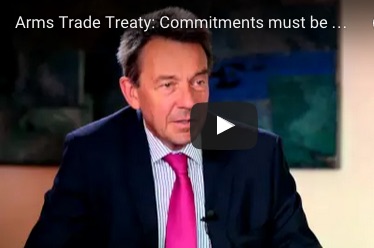DISARMAMENT & SECURITY .
A declaration by the International Committee of the Red Cross
First Conference of the States Parties to the Arms Trade Treaty, Cancun, Mexico, 24-27 August 2015. Statement delivered by Peter Maurer, President of the ICRC, as a video address at the Conference.

ICRC Video
I am honored to be addressing you today on this historic occasion of the First Conference of the States Parties to the Arms Trade Treaty (ATT), a treaty that promises to reduce the tremendous human suffering caused by the widespread and poorly regulated availability of conventional weapons.
The ATT establishes a global norm for responsible arms transfers. By requiring States Parties to consider respect for international humanitarian law and human rights law in their arms transfer decisions and to take measures to prevent the diversion of weapons, this Treaty will help to ensure that arms do not end up in the hands of those who would use them to commit war crimes, serious violations of human rights and other serious crimes.
In adopting the ATT, States have recognized that arms and ammunition can no longer be regarded as just another form of commercial goods. They have recognized that arms transfers require particular caution because of the devastating and irreparable harm that is caused when weapons fall into the wrong hands. And they have explicitly recognized that cooperation, transparency and information sharing underpin the responsible arms trade, and are critical to building confidence among States and therefore to the Treaty’s effectiveness.
The ATT’s aim to increase responsibility and transparency in the international trade in conventional arms will depend not only on the implementation of the Treaty’s requirements by States Parties, but also on the openness and transparency of the forums set up under the Treaty to review its implementation and operation, notably of the Conference of the States Parties. A strong level of transparency, notably in the initial and annual reports required under the Treaty, and in the review of the operation of the Treaty by the Conference of the States Parties will facilitate cooperation and build the confidence necessary for the Treaty’s success. The ICRC urges States Parties to keep this in mind in the decisions that they will take this week, notably on the rules of procedure and on the reporting mechanism.
(Article continued on the right column)
(Click here for a version of this article in French or here for a version in Spanish.)
Do you think handguns should be banned?, Why or why not?
(Article continued from the left column)
The significance of the ATT, and the milestone that this First Conference of the States Parties represents, cannot be overstated. If we have reached this point today, it is thanks to all those who have worked tirelessly over the last decade and a half to make this Treaty a reality: the States that drove the process leading to the ATT’s adoption; the United Nations and the International Red Cross and Red Crescent Movement, which each drew attention to the high human costs of poorly controlled arms transfers; and, of course, the non-governmental organizations which first called for an arms trade treaty some fifteen years ago. In this respect, the crucial role played by the “Control Arms” coalition of NGOs in bringing about the ATT, and the invaluable expertise and assistance that they are now providing to universalization and implementation efforts, must be recognized.
The concerted efforts of States, international organizations, NGOs and the ICRC must be sustained and hopefully increased in the Treaty’s implementation phase, of which this First Conference of the States Parties is the starting point. Our work has only just begun. Not only must we strive to achieve the broadest possible adherence to the Treaty, notably by States involved in the arms trade, but also crucially we must ensure that the Treaty’s core obligations are faithfully implemented, notably through the establishment of robust national control systems.
In this regard, I remain concerned about the gap that subsists between the duty to ensure respect for international humanitarian law in arms transfers, and the actual transfer practices of too many States. The ICRC is directly confronted with this gap, in many countries where we witness the appalling consequences for civilians of the widespread availability and misuse of weapons, which facilitate violations of international humanitarian law, endanger vital medical and humanitarian assistance, provoke displacement and prolong armed conflicts. As weapons continue to flow, either through overt or covert transfers or through diversion, to some of the most brutal armed conflicts such as those seen in parts of the Middle East and of Africa today, there is an urgent need to close the gap between law and practice.
The true measure of success of the ATT is the extent to which this gap will be filled and the Treaty changes people’s lives in the years to come. If States were to join the Treaty but continue to transfer arms to belligerents with a record of committing war crimes or serious violations of human rights, this would severely undermine the ATT’s humanitarian purpose and its credibility.